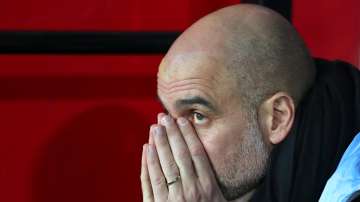Banned and tainted, Manchester City's pursuit for greatness hits ugly roadblock
Manchester City have been banned by UEFA from the Champions League for two seasons because of funneling money around Abu Dhabi to fund sponsorships and comply with UEFA's FFP rules.

Manchester City is now a tainted champion.
A club transformed by lavish investment in part to promote the emirate of Abu Dhabi on the world stage is damaged by deceptions in the pursuit of glory on the soccer field.
Cut through all the raging against the footballing prosecutors by City, UEFA showed there is a price to pay for misleading the governing body of European soccer.
If you don’t play by the rules, you don’t get to play in the Champions League. For two seasons in City’s case. It doesn’t matter if Pep Guardiola is the coach or you have some of the world’s most expensive players in the team.
Banishing such a wealthy, powerful club from its elite competition was a test of resolve.
Not for the leadership of UEFA but the independent investigatory and adjudicatory bodies, with the final verdict decided by a panel headed by a European Court of Justice judge.
When City complained on Friday night that “this is a case initiated by UEFA, prosecuted by UEFA and judged by UEFA,” it was a statement seemingly as misleading as some of its financial reporting.
City appeared to hope the public and UEFA would never discover it was allegedly funneling money around Abu Dhabi to fund sponsorships that helped to ensure it complied with Champions League spending rules.
Already there were questions about the club’s reliance to raise revenue on sponsorships from Abu Dhabi when it has been owned since 2008 by Sheikh Mansour bin Zayed Al Nahyan, a deputy prime minister of the United Arab Emirates and a member of Abu Dhabi’s royal family.
The alleged scheming was only discovered thanks to leaked internal correspondence that City believes should be inadmissible because it is “hacked or stolen” materials. The club has never disputed the authenticity of the documentation gained by German publication Der Spiegel and published in 2018. Nor has it publicly challenged Financial Fair Play rules.
In fact, City accepted the need to be monitored by rules restricting losses and the ability of owners to pump money into clubs for spending on players when it first reached a settlement in 2014 to avoid a Champions League ban.
It is the 2012-16 financial submission from City that became subject to UEFA scrutiny again when the trove of leaks was published appearing to show how the true source of income was being allegedly covered up. Even though Etihad Airways was paying for naming rights and jersey sponsorship, the company appeared to receive most of it back from City’s Abu Dhabi holding company.
According to UEFA City overstated sponsorship revenue and break-even information in documentation. With City planning to appeal to the Court of Arbitration for Sport against the Champions League ban and 30 million euro fine, more extensive details from the case should become public.
City is not a club that likes to be challenged, favoring annual in-house gentler “interviews” with its chairman rather than open news briefings.
When it comes to legal cases, spending on a strong squad is the answer just like on the field. Legal representatives from three different firms were deployed by City at CAS in a hearing last year attempting to get the case thrown out. UEFA was outnumbered 8-2 by City lawyers.
It was the type of defeat City has not become accustomed to in the Sheikh Mansour era.
It was a team that for years wearily watched neighbor Manchester United dominate the Premier League, partly while playing in the third tier before beginning the ascent back to the Premier League in 1999. Abu Dhabi wealth ensured City could compete with United to spend on players in a manner unimaginable before 2008.
When City beat United to the Premier League title in the closing minutes of the 2011-12 season it ended a 44-year title drought. The Premier League trophy has been collected three times more since then and it's currently in City’s possession after edging Liverpool by a single point last season.
City will soon be surrendering the silverware to Liverpool due to its 25-point deficit in the league rather than any investigations. The Premier League, though, continues to look into the financial dealings unearthed in the leaks.
The one trophy that has eluded City is the one — as it stands — it won’t get to compete for again after this season until 2022-23.
And what prospect of Guardiola sticking around for the entire period in European exile, with his City contract in its final 18 months already?
Guardiola has been the public face from City defending the club’s conduct, but he is far removed from the financial division.
The loss of Champions League television and prize money alone — almost 100 million euros last season — will prove costly to City’s domestic mission to provide a greater challenge to Liverpool next season.
Factor in too that City will still have to comply with FFP rules if it qualifies for Europe again in 2022. So, once again, regardless of the owner’s wealth, lavish spending on players will be not feasible.
And just like in the early years of Sheikh Mansour’s ownership, City will have to convince players to join and settle for not playing in the Champions League.
City’s place in the game and world sport is diminished again. The vehicle to promote the Abu Dhabi brand is now associated by many with rule-bending rather than just excellence in sport.